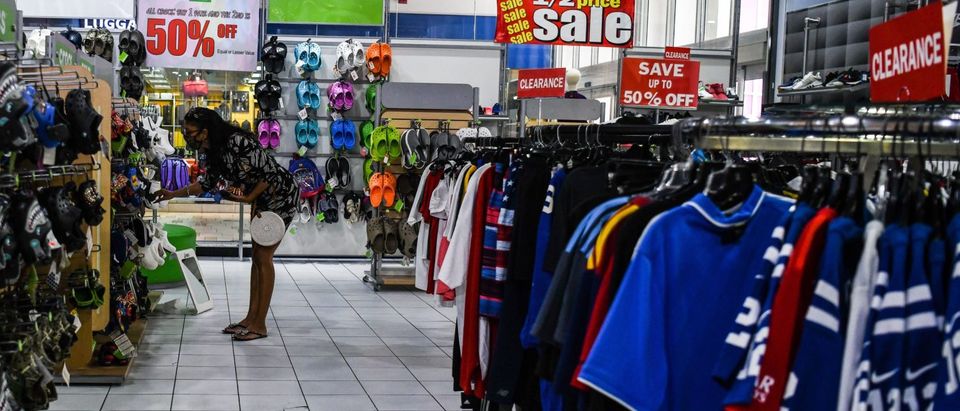Editor’s note: We endeavor to bring you the top voices on current events representing a range of perspectives. Below is a column arguing that a V-shaped economic recovery after the coronavirus pandemic is unlikely. You can find a counterpoint here, where Stephen Moore, a senior fellow at FreedomWorks, argues that a V-shaped recovery is possible as long as President Donald Trump enacts certain policies.
Even factoring in the George Floyd-related riots and their likely damage to big city well-being all over the United States, you can still make pretty convincing arguments that the recovery from the economy’s pandemic-induced nosedive will be V-shaped – i.e., strong and fast.
You can still credibly claim that, because the economy was shut off like a light switch, it can be turned on just as easily. You can observe that the amount of pent-up demand is gargantuan. You can note that all fifty states are already reopening in some fashion, and point to signs of intense frustration with the lockdowns. You can cite indications of bottoming and even modest activity upticks in some of the hardest-hit sectors, like travel and accommodation. And you can argue that the U.S. stock market, whose own rebound has been V-shaped, often predicts the real economy’s performance well.
All the same, for the following reasons alone, the case for pessimism still looks considerably stronger.
Despite the reopenings and protests supporting them and the videos of vibrant boardwalks, packed seashores, and cheery restaurant patios, most polls show that large numbers of Americans are still wary about returning to pre-virus ways and about the wisdom of a faster restart. Two upcoming developments could well heighten these fears: the tide of dreadful unemployment, growth and other economic statistics certain to dominate headlines over the next month, and the high odds of some kind of second coronavirus wave arriving along with fall and winter.
Especially noteworthy: Virus fears remain strong even though evidence of low mortality for most of the nation keeps accumulating. A main reason, of course: the ease with which non-symptomatic carriers can infect more vulnerable family, friends and others.
In principle, these fears could be calmed considerably once an effective vaccine or cure, or reliable testing, becomes widely available. Yet as all the nation’s instant medical experts have learned, vaccine development is a protracted process at best – that’s when vaccines can be discovered at all, whether because viruses can mutate, or because, as with the common cold and HIV, they can be intrinsically tough nuts to crack. In addition, significant uncertainties remain about the various tests that are finally being administered in impressive numbers.
Purely economic reasons for protracted hard times abound as well, and they start with the impact on consumer behavior of the virus’ sheer virality. Precisely because the disease spreads so easily, the economy’s most devastated sectors have included those that both are highly labor-intensive on the productive side, and depend on serving customers in person. And as of last year, according to the U.S. Commerce Department, these sectors represented about twenty percent of all national output and just over forty percent of all American workers (before counting government at any level) Don’t imagine that on-line shopping comes close to dominating the huge American retail workforce. The U.S. Labor Department reports that its share was only 2.38 percent in 2019.
The chances of a vigorous bounceback look grim as well. For example, a recent academic study found that as of mid-May, at least two percent of all American small businesses had closed for good, and the National Restaurant Association estimates that figure at three percent for eateries. In early May, a survey reported that 12 percent of such businesses expected to close within a month, and 52 percent believe they have only six months left.
In turn, business failure on this scale could set off a long-term vicious cycle. For permanently shuttered businesses mean much higher, longer-lasting joblessness, and the longer individuals stay away from the workplace, the tougher the challenge they often face in finding new jobs – especially at their previous income levels. More unemployment, of course, can only depress the consumer spending that has long comprised some 70 percent of all U.S. economic activity, even with generous unemployment benefits.
Jobholders’ pursestrings can be affected as well, as they understandably hold off on purchases and try to bolster their savings in order to prepare for a continued or worsening slump, or for future economic or non-economic shocks. All of which further depresses the demand that businesses ultimately need to survive. Special bonus: Lower spending would also threaten the falling prices that the Federal Reserve has long feared will turn into the kind of deflation that creates its own growth-killing momentum. The reason: Consumers could put off many purchases as long as they’re convinced that better deals are just around the corner.
Don’t forget, moreover, that business bankruptcies en masse would endanger the finances of many of their landlords and possibly of their landlords’ creditors. Widespread mortgage defaults would have similar impacts on the nation’s residential real estate and huge housing finance sector, and Federal Reserve and Congressional rescues would be likelier to represent bandaids rather than genuine cures.
The domestic manufacturing sector, – where wages and benefits are still relatively high, and which has long been a productivity growth champion, – won’t escape serious damage, either. In fact, it faces a double-whammy. A slumping U.S. economy shrinks the still-sizable American market that domestic industry serves. Meanwhile, contracting foreign economies whose own recoveries may not be V-shaped threaten the roughly 18 percent of American manufacturers’ annual output that U.S. Census Bureau figures show has been going overseas.












